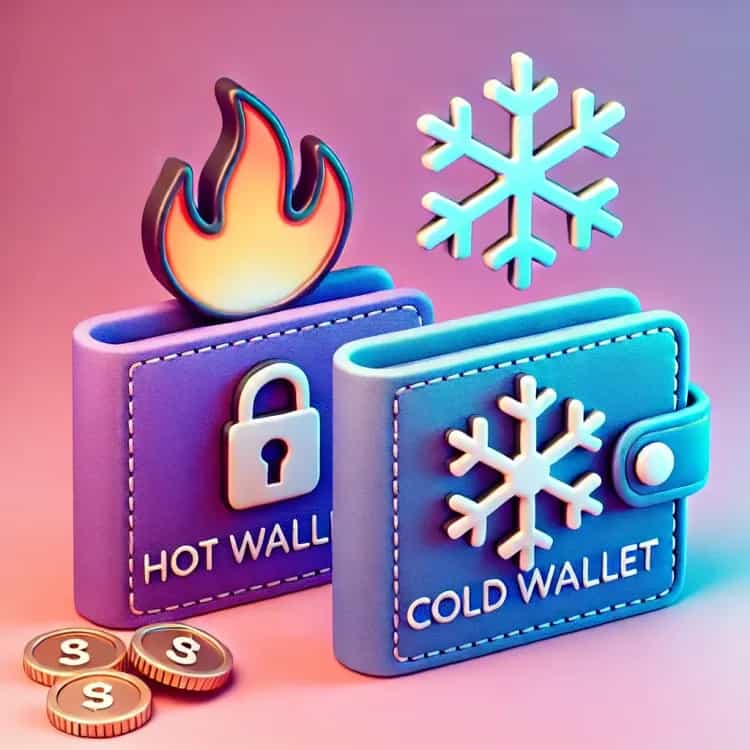Cold Crypto Wallet vs. Hot Wallets: Which One Offers Better Protection?


Choosing the right crypto wallet can be a game-changer for the security of your digital assets. With the variety of wallet types on the market, the big question remains: Which one offers better protection? In this article, we’ll explore both wallet types in detail and help you make an informed decision.
What is a cold wallet in crypto?
A cold wallet, also known as a hardware or offline wallet, is a crypto storage device that keeps your private keys completely offline. This can be a specialized hardware device or even a piece of paper containing printed keys. Cold wallets are trusted for long-term storage because they minimize exposure to hackers. Since these wallets don’t connect directly to the internet, you’re protected from most online threats. However, remember that physical damage or loss of the device itself can lead to permanent loss of your funds. If you need more tips on how to create your Wallet, check out our previous blogs on Rango Learn Center.
What is a hot wallet in crypto?
A hot wallet is any crypto storage solution that’s connected to the internet, for instance, web-based wallets, mobile wallets, or desktop applications. Because they’re always online, these wallets make sending and receiving funds extremely convenient. Hot wallets are generally free to set up and are straightforward for day-to-day transactions. Yet, their perpetual internet connectivity can expose them to hacks and phishing attempts.
Security differences between cold and hot wallets
If you don’t control the keys, you don’t control the coins. Andreas M. Antonopoulos
How cold wallets provide enhanced security
Cold wallets drastically reduce online vulnerabilities by storing private keys offline. While accessing funds from a cold wallet requires additional steps, such as connecting your hardware device to a computer or manually scanning QR codes, this extra layer of isolation acts as a robust defence against online threats.
Potential risks and vulnerabilities of hot wallets
On the other hand, hot wallets remain at risk of malware, phishing attacks, and data breaches because their private keys are stored on internet-connected devices or servers. Though reputable providers often use encryption and other safety measures, the inherent online exposure still presents a higher risk factor.
Factors to consider when choosing between cold and hot wallets
Choosing the right type of crypto wallet can make a big difference in how securely and conveniently you manage your assets. Whether you're holding for the long term or trading frequently, understanding the pros and cons of cold and hot wallets is essential.

Ease of use and accessibility in hot wallets
For active traders and those who frequently move their crypto assets, a hot wallet is often the go-to choice. You can transact quickly, monitor the market in real time, and seize opportunities without the hassle of connecting an external device. However, balancing accessibility with security is crucial. Always enable two-factor authentication (2FA) and consider using trusted service providers.
Long-term storage and protection in cold wallets
If your primary goal is long-term hodling, cold wallets shine because they keep your assets offline and away from prying eyes. While you sacrifice immediate convenience and sometimes pay for dedicated hardware, the significantly reduced risk of unauthorized access can be worth it.
Choosing the best wallet for your crypto security needs
When to use a cold wallet for optimal protection
A cold wallet is ideal for large holdings or assets you plan to keep for an extended period. If you’re someone who doesn’t trade daily and simply wants to shield your crypto from potential online threats, investing in a cold wallet is a smart move. Andreas Antonopoulos famously reminded the crypto community that “Not your keys, not your coins,” emphasizing the importance of complete control over private keys, which cold wallets readily offer.
When are hot wallets suitable for active traders?
If active trading or frequent transfers are essential to your strategy, consider using a reputable hot wallet. Hot wallets let you move funds swiftly between exchanges and personal wallets, and they integrate seamlessly with decentralized applications (dApps). However, never store your entire portfolio in a single hot wallet. It’s wise to split your holdings, keeping most of your funds in cold storage and only what you need for immediate trading in a hot wallet.
Conclusion
When it comes to cold wallet crypto vs. hot wallets, there’s no one-size-fits-all solution. Your choice depends on factors like trading frequency, amount of crypto holdings, and your comfort level with technology. By understanding the core differences and applying smart security practices, you can enjoy both convenience and peace of mind.
Frequently asked questions
Check out most commonly asked questions, addressed based on community needs. Can't find what you are looking for?
Contact us, our friendly support helps!
What if I lose my cold wallet device?
You can restore your funds using the recovery seed you set up when initialising the wallet. Always keep a backup of this seed in a secure location.
Is a hot wallet safe if I only keep small amounts in it?
enerally, yes. Keeping smaller amounts in hot wallets limits your risk. Still, always enable security features like password protection, 2FA, and strong encryption.
Can I use both cold and hot wallets at the same time?
Absolutely. Many users keep most of their assets in cold storage and only maintain a hot wallet for routine transactions or trading.




